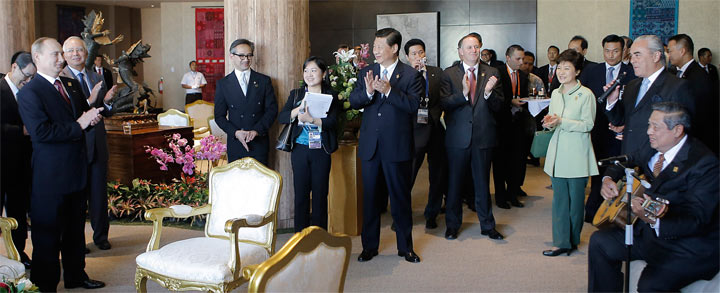APEC 'should take lead' in FTA talks
 |
|
Chinese President Xi Jinping joins APEC leaders to say "happy birthday" to Russian President Vladimir Putin on the Indonesian resort island of Bali on Monday, with Indonesian President Susilo Bambang Yudhoyono playing Happy Birthday to You on a guitar. Abror Rizki / Agence France-Presse |
Beijing remains open to trade pacts that are inclusive, president says
The Asia-Pacific Economic Cooperation mechanism should lead and coordinate the negotiations over free trade areas in the region, President Xi Jinping said, as several FTAs are competing for dominance.
Addressing the 21st economic leaders' meeting of the APEC in Bali, Indonesia, Xi also said Beijing is open to all trade arrangements as long as they are inclusive.
The Asia-Pacific region harbors more than 100 free trade agreements, and sees the US-led high-threshold Trans-Pacific Partnership and the ASEAN-led Regional Comprehensive Economic Partnership arrangements competing for dominance.
Analysts said better coordination and information sharing among all those mechanisms will help avoid trade protectionism and fragmentation of the world trade system. Such coordination will help create the FTA of the Asia-Pacific.
The 21-member APEC boasts around half of the world's economic output and trade, and remains the world's growth engine despite weak economies in developed countries.
The world is looking at the APEC annual forum in Bali for further growth signals, with China, the world's second-largest economy and emerging top world trader, under a spotlight.
Xi said the APEC should play "a leading and coordinating role" for regional FTA integration, and "launch an information exchange mechanism for free trade areas as early as possible".
"Regional free trade arrangements should keep APEC leaders informed of the progress made in their negotiations and the results achieved", to create favorable conditions for having an FTA that covers the whole Asia-Pacific, Xi said.
As the world trade negotiations headed by the World Trade Organization see little progress, many countries are turning to bilateral and multilateral FTAs.
The Trans-Pacific Partnership, featuring confidential talks and the highest free trade standard beyond mere lower tariffs, is widely considered a new step for the US to dominate the economy in the Asia-Pacific region. But negotiations have been hampered due to great disparities in its member economies and its high standards.
Lu Jianren, a research fellow with the National Institute of International Strategy under the Chinese Academy of Social Sciences, said the APEC mechanism is more inclusive and more mature compared with other regional mechanisms.
While all these mechanisms should finally lead to the Asia-Pacific FTA, these mechanisms should be coordinated by APEC, Lu said.
According to Lu, while the different systems are competitive with each other, the TPP will benefit developed countries with mature market rules and big international capital, instead of small and medium firms.
Lu said an FTA information exchange mechanism as proposed by Xi will benefit all economies, as the TPP negotiations are confidential.
"The mechanism will make the free trade talks transparent. But it is hard to realize," Lu said.
Zhang Tuosheng, a researcher at the China Foundation for International and Strategic Studies, said if the TPP comes into effect, it means that developed countries will continue to make the new trade rules.
Those rules will put developing economies at a disadvantage, Zhang said.
As a developing economy, China should focus on its trade arrangements with ASEAN, South Korea and Japan, Zhang said.
Experts also warned that if the trade agreements are discriminatory and exclusive, it will derail the general trend of global economic integration and give rise to trade protectionism.
Yu Jianhua, deputy international trade representative of the Ministry of Commerce, told a June FTA forum that China has to avoid having one or a handful of developed countries dominate trade mechanism negotiations, in case they impose their domestic rules on the region.
Contact the writers at wujiao@chinadaily.com.cn and baochang@chinadaily.com.cn
Mo Jingxi contributed to this story.
Related:
Chinese business circle pledge involvement in APECXi hails APEC's role in open world economy
APEC leaders meet on growth, cooperation
APEC to play major role in shaping FTAAP
Australia confident of FTA with China

























